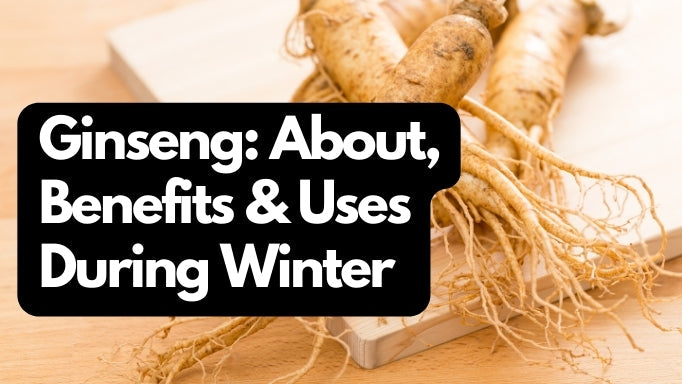
As winter blankets the world in a chilly embrace, our bodies often yearn for extra care and support to navigate through the seasonal changes. Ginseng has a wealth of potential health benefits, offering a unique blend of adaptogens and antioxidants. We will discover the origins of ginseng, its impressive array of benefits, and how incorporating it into your winter routine can be a game-changer for your overall well-being.

The Roots of Ginseng
Ginseng, scientifically known as Panax, is a perennial plant with fleshy roots that have been used for centuries in traditional medicine, particularly in East Asia. The name "Panax" is derived from the Greek word "panacea," emphasising its reputation as a possible cure-all. There are many varieties of Panax, but there are 12 different types of Panax ginseng, with the most common varieties being Asian ginseng (Panax ginseng) and American ginseng (Panax quinquefolius).

Types of Ginseng
Below are 5 popular varieties of ginseng and why they are good for winter.
1. Prince Ginseng Root
Prince Ginseng (Tai Zi Shen) is rich in ginsenosides and antioxidants, potentially supporting the immune system during winter and could provide an energy boost.
2. Asian Ginseng
Known for its adaptogenic properties, Asian ginseng (Ren Shen) may help the body adapt to stressors, making it potentially beneficial for managing the physical and mental stresses often encountered during the winter season.
3. American Ginseng
Considered a milder ginseng variety, American ginseng (Xi Yang Shen) is known for its possible calming and nourishing properties, which may be suitable for addressing winter-induced fatigue and promoting overall well-being.
4. Siberian Ginseng
As a potential adaptogenic herb, Siberian Ginseng (Ci Wu Jia) may help the body cope with stress, fatigue, and cold weather, making it a potentially valuable ally for winter resilience.
5. Notoginseng
Notoginseng (San Qi Panax) is potentially associated with cardiovascular benefits, which may be particularly relevant during winter when cold weather can put additional strain on the cardiovascular system. It may contribute to overall heart health during this season.

Potential Benefits of Ginseng in Winter
- Potentially Boosts Immune System
- May Increase Energy and Stamina
- Potential Adaptogenic Properties
- May Improve Cognitive Function
- Could Regulate Blood Sugar

4 Uses of Ginseng in Winter
Why not give these different uses a try for a good winter feeling?
1. Tea Infusions
Enjoy a warm cup of ginseng tea to kickstart your day. The soothing warmth and the immune-boosting properties make it an ideal beverage for the colder months.

2. Supplements
For a more concentrated dose, consider incorporating ginseng supplements into your daily routine. Consult with a healthcare professional before adding any new supplements to your regimen.

3. Incorporate into Soups and Stews
Ginseng can be added to winter soups and stews, infusing your meals with its potential healthful properties while adding a unique flavour.

4. Ginseng Honey Tonics:
Combine ginseng with honey and cinnamon for a delicious and nutritious tonic. The soothing nature of honey complements ginseng's benefits, creating a potentially potent elixir for winter wellness.

Shop Ginseng
Summary
As winter casts its icy spell, ginseng stands out as a natural ally, providing a wealth of benefits to fortify your health and well-being. Whether sipped as a tea, added to soups, or taken as a supplement, ginseng can be a valuable addition to your winter routine. Embrace the power of this ancient herb and let it help you thrive throughout the colder months, potentially keeping you energised, resilient, and ready to face whatever winter brings your way.
